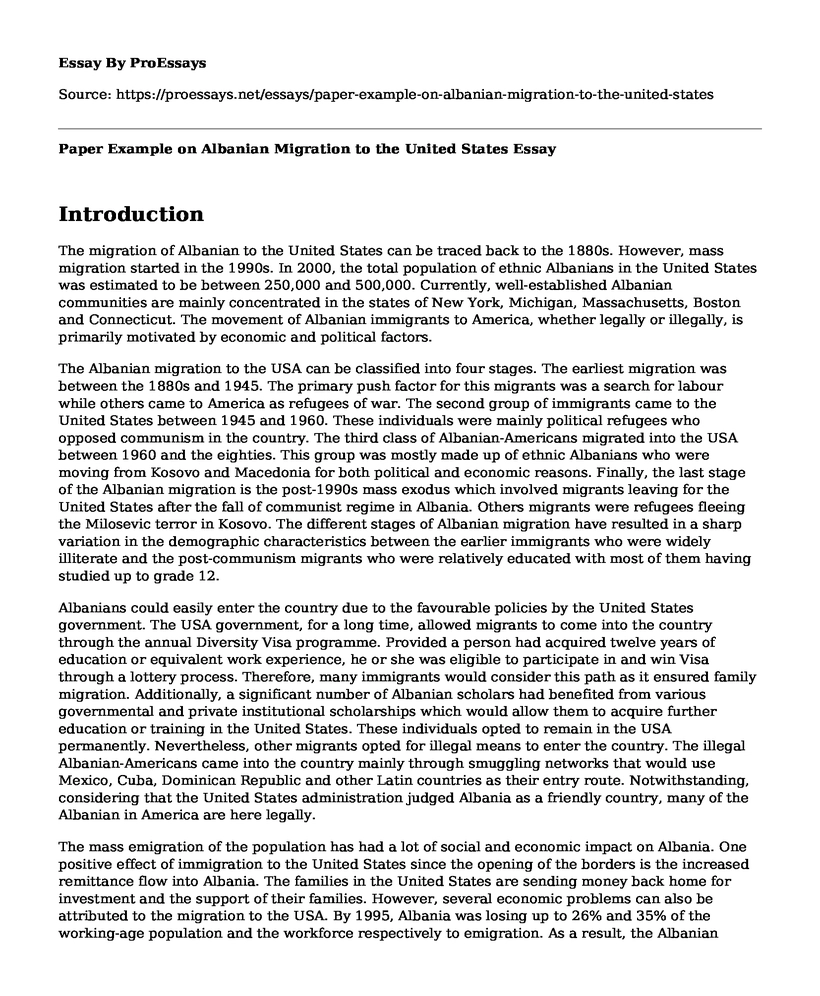Introduction
The migration of Albanian to the United States can be traced back to the 1880s. However, mass migration started in the 1990s. In 2000, the total population of ethnic Albanians in the United States was estimated to be between 250,000 and 500,000. Currently, well-established Albanian communities are mainly concentrated in the states of New York, Michigan, Massachusetts, Boston and Connecticut. The movement of Albanian immigrants to America, whether legally or illegally, is primarily motivated by economic and political factors.
The Albanian migration to the USA can be classified into four stages. The earliest migration was between the 1880s and 1945. The primary push factor for this migrants was a search for labour while others came to America as refugees of war. The second group of immigrants came to the United States between 1945 and 1960. These individuals were mainly political refugees who opposed communism in the country. The third class of Albanian-Americans migrated into the USA between 1960 and the eighties. This group was mostly made up of ethnic Albanians who were moving from Kosovo and Macedonia for both political and economic reasons. Finally, the last stage of the Albanian migration is the post-1990s mass exodus which involved migrants leaving for the United States after the fall of communist regime in Albania. Others migrants were refugees fleeing the Milosevic terror in Kosovo. The different stages of Albanian migration have resulted in a sharp variation in the demographic characteristics between the earlier immigrants who were widely illiterate and the post-communism migrants who were relatively educated with most of them having studied up to grade 12.
Albanians could easily enter the country due to the favourable policies by the United States government. The USA government, for a long time, allowed migrants to come into the country through the annual Diversity Visa programme. Provided a person had acquired twelve years of education or equivalent work experience, he or she was eligible to participate in and win Visa through a lottery process. Therefore, many immigrants would consider this path as it ensured family migration. Additionally, a significant number of Albanian scholars had benefited from various governmental and private institutional scholarships which would allow them to acquire further education or training in the United States. These individuals opted to remain in the USA permanently. Nevertheless, other migrants opted for illegal means to enter the country. The illegal Albanian-Americans came into the country mainly through smuggling networks that would use Mexico, Cuba, Dominican Republic and other Latin countries as their entry route. Notwithstanding, considering that the United States administration judged Albania as a friendly country, many of the Albanian in America are here legally.
The mass emigration of the population has had a lot of social and economic impact on Albania. One positive effect of immigration to the United States since the opening of the borders is the increased remittance flow into Albania. The families in the United States are sending money back home for investment and the support of their families. However, several economic problems can also be attributed to the migration to the USA. By 1995, Albania was losing up to 26% and 35% of the working-age population and the workforce respectively to emigration. As a result, the Albanian economy lost most of its low-skilled labourers. The mass exodus also increased rural-urban migration which interfered with the rural economy significantly. Farming was greatly affected following this migration trend. Furthermore, the country lacks enough high-skilled workers as a result of brain drain. Aside from a significant amount of remittance flow into the country, the Albanian migration into the United States has negatively affected the Albanian economy.
Following the immigration to the United States, there has been a development of an Albanian community in the country. A large number of the community is established in the states of New York, Michigan and Massachusetts. The three states account for up to 60% of the Albanian-American population. This group of the population contribute to the American economy by running businesses and working. Most of these individuals are well educated with bachelor's degree from colleges. Hence, they equally compete with the non-Albanian Americans for job opportunities. Besides, the low skilled labourers also have a share of the country's job market. The Albanian community in the USA, have successfully embraced the economic opportunities in the country
Conclusion
In summary, the emigration from Albania to the United States was mainly as a result of economic reasons in addition to political asylum. The immigration, which can be traced back to the war period of between the 1880s and 1945, was hugely favoured by the friendly United States' government policies. Although the migration en mass in the 1990s greatly interfered with the Albanian economy, it resulted in the development of a significant population of the Albanian population in the United States. These individuals are key players in USA's economic development through business and contribution to the workforce. The immigration of Albanians into the USA has helped many achieved their 'American dream' of economic freedom and political safety.
Cite this page
Paper Example on Albanian Migration to the United States. (2022, May 16). Retrieved from https://proessays.net/essays/paper-example-on-albanian-migration-to-the-united-states
If you are the original author of this essay and no longer wish to have it published on the ProEssays website, please click below to request its removal:
- Essay Example on the Climatic Change in Canada
- Essay Example on California vs Hawaii: Comparing NPs' Laws & Requirements
- Essay Example on U.S. Supreme Court Ignores Film Industry's Artistry Until Oscars
- Canadian Govt Leadership Competency Profiles: HR Needs & Prof'l Standards - Essay Sample
- Western Sahara: Changes in Elderly and Working-Age Populations Since 1950 - Essay Sample
- Essay Sample on Dual Court System: A Comprehensive Overview
- Free Report Sample on Committee on Privileges & Elections Report on US Elections & Voting Rights







